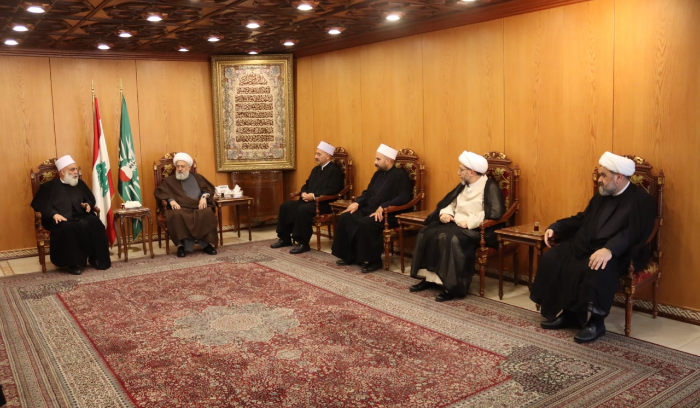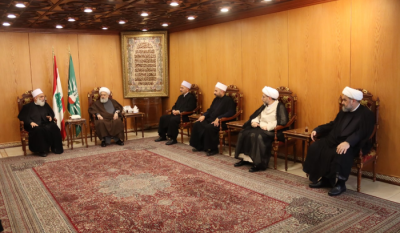The Deputy President of the Supreme Shiite Islamic Council, Sheikh Ali Khadra, received the Sheikh of the Druze Monotheists, Sheikh Sami Abi Al-Muna, at the council's headquarters, leading a delegation of sheikhs that included: the Druze jurisprudence judge Gandhi Makarem, council member Muhammad Ghanem, and advisors to the Sheikh of Druze for higher education Dr. Nabigh Dhabyaneh and personal status Daniel Saeed, as well as the assistant Sheikh Khuldon Al-Hosni. The meeting also included the member of the Shari'a Council Mufti Sheikh Hassan Abdallah, Judge Sheikh Mahdi Al-Yahfoufi, Secretary of the Council Muhammad Rizq, and advisor Dr. Ghazi Qansou, along with Sheikhs Ali Shams Al-Din and Abdel Salam Shukr. They discussed national and religious issues and reviewed the general situation in Lebanon and the region.
In a statement after the meeting, Sheikh Abi Al-Muna said, "We were honored today to visit the Supreme Shiite Islamic Council and met with His Eminence and the brothers in the esteemed council to congratulate them on the blessed Eid Al-Fitr and to reaffirm our common message in this country, our religious and ethical message and our spiritual message, amid the world we face with the interests of states and their aggressions, especially the Israeli aggression that persistently carries out its blatant assaults against the people, the latest being the killing of journalist Shireen Abu Akleh in Palestine. There are certainly multiple political disagreements in Lebanon. We wanted to seize the occasion of Eid Al-Fitr to assert from this esteemed house that our message is one, and that our role in the spiritual authorities is to unite, not to divide, and to spread the appropriate atmosphere of love, harmony, and brotherhood among citizens, not division, no matter what the challenges and national entitlements may be; there is no need for us to collide."
He added, "There are different opinions and varying, perhaps even contradictory, stances but they do not spoil relations. We, as I have always told His Eminence, steer away from anything that divides us and lean towards all that unites us; this is our message and what we must continue on. We also affirmed that spiritual meetings among us and at all levels of spiritual authorities should remain continuous and be a goal for us to show through them this position, a position of shared values, a position of love, brotherhood, and mercy that we have focused on and continue to focus on for the sake of this suffering people, and to call on the state, even sometimes loudly, to pay attention to this people and address their issues while we stand with it for the dignity of the people and for the future of Lebanon."
Sheikh Khadra stated, "This house is for all Lebanese, and I reaffirm all that His Eminence Sheikh said, whom we always welcome in this house—it is his house and the house of all Lebanese, especially for all Lebanese religious leaders who have a fundamental role in uniting the Lebanese and working to solve their problems and bring their viewpoints closer. Now, at this crucial stage in Lebanon's history, meeting and consultation are more necessary than ever. His Eminence is always a pioneer in this area, and we are together on a unified position regarding the necessity of cooperation among religious institutions to gather voices and extricate the country from anything that could lead to sectarian fanaticism and sectarian problems. We are on the threshold of an important electoral entitlement; all parliamentary and national entitlements are important. Our message today to all Lebanese is to perform this entitlement with ease, and that each party express through their vote in the ballot box what they want and that this occasion should not be a platform for sectarian and political bidding at the expense of the citizens’ interests and the fate of the homeland, as we are in a phase where the fate of the country is at stake. This is our message to pass this entitlement calmly and for the Lebanese to attend the ballot boxes and not to hesitate to express their presence in the polling stations to cast their votes, thus expressing their position and the importance of stability for the country and the future of citizens and solving their problems in this critical and significant circumstance; they are now responsible for what will happen in the future."
Sheikh Khadra continued, "Lebanese who hesitate to cast their votes in the ballot box are responsible for what will happen in the future, and these results will determine the fate of the country going forward and will be as the Lebanese want. Therefore, conflicts should not occur in the streets; differing opinions should be gathered in parliament, which represents all Lebanese. Consequently, institutions, whether the presidency or the government, are a result of parliament. Thus, we must extricate this country from sectarian and political tensions. We once again welcome His Eminence Sheikh and thank him for this visit, which is natural, as we are always in communication and consultation for the interest of Lebanon and the Lebanese."




